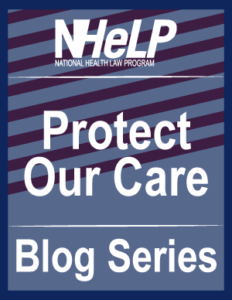 Before the Affordable Care Act (ACA), people with HIV often faced a catch-22. They could not enroll in Medicaid until their condition deteriorated so much that they qualified on the basis of disability, even though having coverage and treatment could keep them healthy. The Affordable Care Act (ACA) has increased coverage for people living with HIV in the private insurance market, as well as through the expansion of Medicaid to low income adults. Medicaid is now the largest source of health coverage for the 1.2 million people in the United States living with HIV.
Before the Affordable Care Act (ACA), people with HIV often faced a catch-22. They could not enroll in Medicaid until their condition deteriorated so much that they qualified on the basis of disability, even though having coverage and treatment could keep them healthy. The Affordable Care Act (ACA) has increased coverage for people living with HIV in the private insurance market, as well as through the expansion of Medicaid to low income adults. Medicaid is now the largest source of health coverage for the 1.2 million people in the United States living with HIV.
The House Republican’s so-called “American Health Care Act (AHCA),” however, would repeal portions of ACA and significantly cut Medicaid by imposing per capita caps, effectively reversing this progress.
Treatment = Life
Getting tested, starting treatment and consistently managing HIV is challenging enough for individuals who have health insurance coverage, especially for those from minority populations. An estimated 20 percent of people living with HIV do not know their status, and nearly 60 percent are not in regular care. Under ACA’s coverage options, low income persons have access to regular care, including important preventive services such as HIV testing. Moreover, providing individuals with HIV access to treatment and medical care has additional benefits. Studies show that continuous and comprehensive treatment of HIV reduces the likelihood of transmitting the virus by 96 percent.
Opening the door to health insurer discrimination
Before ACA, health insurance companies discriminated against people living with HIV/AIDS. Plans denied coverage to individuals with pre-existing conditions and imposed annual and lifetime caps on benefits, which disproportionately affected people living with HIV and AIDS. ACA requires plans to provide essential health benefits, including prescription drug coverage. Plans, moreover, cannot discourage people with HIV or other significant health needs from enrolling through plan benefit designs and marketing practices that discriminate.
AHCA, however, allows states to waive the essential health benefits such as prescription drugs and other key protections. Even without doing so explicitly, states will be able to waive other provisions that have the same effect of discriminating against people living with HIV.
In any of these scenarios, people living with pre-existing conditions will be subject to burdensome costs for life-saving treatment that has allowed people living with HIV/AIDS to lead healthy lives, continue to work, remain in the community with their families, and prevent transmission. Per capita caps in Medicaid will exacerbate public health and the economy as federal funds fall shorter and shorter each year, cutting off access to more and more people who need this treatment as the population ages and the disease spreads.
States of Emergency
When spikes in new HIV infections occur, states need to have the flexibility and federal funding to respond, as demonstrated by the HIV outbreak in Indiana in 2015. Per capita caps create barriers for states to respond to these spikes because states will not receive any additional funding per person even though their health care costs would rise dramatically. The state would also be strained to implement prevention programs or other system-wide interventions because it would need to fund the entire program without federal support. Furthermore, these cuts will cause healthcare costs for states and individuals to rise to the point of preventing people living with HIV from accessing treatment until the disease has progressed, often to the point where they can no longer work, when treatment is exponentially more expensive and the states will be forced to bear additional costs from the loss of labor. A “state of emergency” becomes a problem for the state, and the state alone.
Lives are at stake
Medicaid per capita caps and the repeal of the ACA under AHCA threaten the lives of hundreds of thousands of people living with HIV. In 2015, the White House prioritized four goals in the National HIV/AIDS Strategy for the United States to achieve by 2020: (1) reduce new HIV infections, (2) increase access to care and improve health outcomes for people living with HIV, (3) reduce HIV-related disparities and health inequities, and (4) achieve a more coordinated national response to the HIV epidemic. It is not too late to turn these goals into reality. Call your senators and urge them to vote against AHCA.
For more information on AHCA and its impact on the Medicaid program, sign up for our email updates and follow us on Twitter and Facebook.

